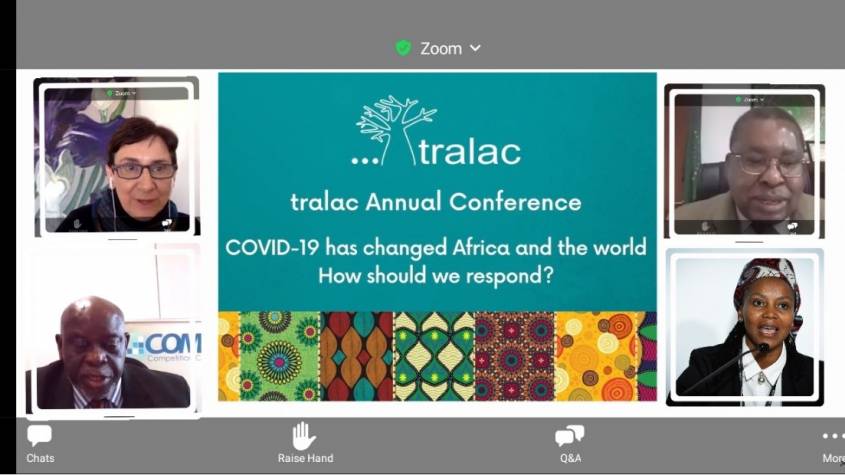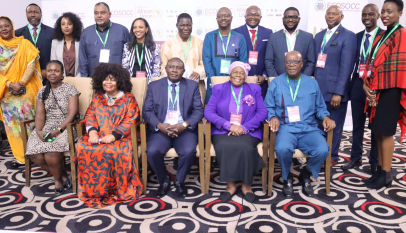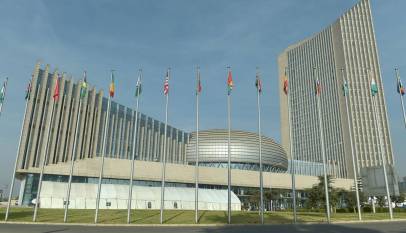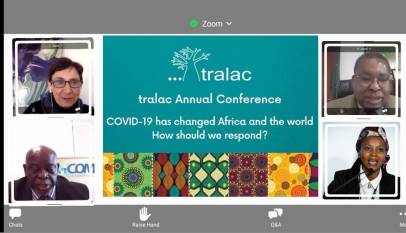Covid-19, e-trade and gender predominate at tralac’s 2021 conference
Deliberations at tralac’s 2021 Annual Conference centred on how Africa can build effective public health preparedness against Covid-19 and future pandemics as well as the role of women, youth and SMEs in the continent’s emerging digital trade space

By Adam Alqali & Stephen Enoch
As the third wave of the Covid-19 pandemic continues to ravage the African continent, tralac’s Annual Conference held virtually for the second time, last week, due to restrictions occasioned by the pandemic which has exposed Africa’s fragile healthcare systems. This has subsequently left the continent at the mercy of vaccine donations by developed countries of the world in an era of vaccine nationalism.
This prevalent circumstance rationalizes tralac’s 2021 conference’s theme: ‘COVID-19 has changed Africa and the world. How do we respond?’ Thus, discussions at the 2-day convening centred on how Africa can build an effective public health preparedness system against Covid-19 and future pandemics; role of gender in trade; and the implications of the proposed AfCFTA Protocol on Women, Youth and SMEs as well as the Protocol on E-commerce (Digital Trade). The virtual convening also featured the launch of tralac’s: ‘Trade and Gender in Africa’s Trade Agreements’: a comprehensive review of all gender-related provisions in Africa’s trade agreements, including the AfCFTA.
Among others, the conference also featured a session on tralac’s SheGovernsTrade (SGT) Development Programme, whose objective is to capacitate and empower particularly young women policymakers to contribute towards enhancing trade governance in Africa; tralac’s SGT programme focuses not only on development of technical trade skills but also professional skills development, change management skills and mentoring. During the session, many SGT alumni had shared their personal experiences participating in the programme.
“No market integration without a competition policy” – tralac board chair
In his opening remarks, Mr George Lipimile, chair of tralac’s board, said the pandemic had created significant setbacks in terms of both intra-African trade and trade within African countries as well as halting the implementation of the AfCFTA. Mr Lipimile said the pandemic had also brought to the fore Africa’s overdependence on import including in the health sector as global supply chains disruptions continued hence the urgency and necessity of discussions on the implication of Covid-19 on Africa’s health infrastructure.
Mr Lipimile said because tralac considers the AfCFTA as crucial to Africa’s development it had since as far back as 2014 – even before negotiations on the Agreement commenced – been hosting training workshops and publishing legal and policy documents as well as analyses on topics relevant to the negotiations and implementation of the agreement. He said, if properly designed and implemented, the AfCFTA would bring about crucial progress in Africa’s trade governance and however, expressed his regrets as finalizing negotiations on the Free Trade Area had proved to be ‘an uphill task’.
“The AfCFTA process is running out of steam, my fear is that businesses and investors may develop fatigue on the task of continental integration. AfCFTA entered into force on 30 May 2019, since then more than one deadline had been missed; the entry into force of an incomplete agreement of this ambitious scale was probably not a bright idea. The pressure to maintain a forward momentum in order to ratify a complete agreement has been lost,” cautioned Mr Lipimile.
Moreover, the tralac board chair said achieving true continental market integration would not be possible without a continental competition policy which is planned to be part of Phase II of negotiations under the AfCFTA, hence the need to fast-track the commencement of negotiations on the competition policy which would foster inclusion under the CFTA regime. “Competitive markets enhance economic warfare by fostering efficiency in productivity and commerce. The competition policy shall promise lower prices, high quality and improved choices for consumers, contributing to further economic growth and increased employment.”
Mr Lipimile said despite significant progress made in advancing women’s and girls’ rights globally, the road to gender equality was still a long one in Africa adding that the Covid-19 pandemic also disproportionately affects women and girls, a majority of whom work in the vulnerable sectors of the economy. He said women and girls in Africa also faced more barriers, compared to men and boys, in terms of access to education and capital which limits their opportunities for growth and overall contribution to the continent’s economic development.
“Inclusion of health in AfCFTA’s services protocol will boost Africa’s response to pandemics” – Muchanga
Amb Albert Muchanga, AU Commissioner for Economic Development, Trade, Industry and Mining, who was one of the keynote speakers at the tralac conference acknowledged that despite significant progress vis-à-vis negotiations and implementation of the AfCFTA, a lot still remains to be done. Muchanga decried the prevailing snail’s pace of vaccination in Africa, lamenting that although the AU had targeted to vaccinate 60% of the continent’s population by 2022, less than 2% of the population had been vaccinated so far, due to not only lack of access to vaccines but also low-level of trust in governments and the vaccine itself among Africans.
Muchanga noted that AU member states were monitoring the proposed temporary suspension of intellectual property rights for Covid-19 vaccines by the World Trade Organisation (WTO), which would license African countries to manufacture their own vaccines for the treatment of Covid-19, adding that only five countries currently have vaccine production capacity, namely; Egypt, Ethiopia, South Africa, Senegal and Tunisia.
“This waiver will offer Africa a window of opportunity to manufacture and distribute vaccines in order to save lives. More than 99% of vaccines being used currently are being imported; this is not sustainable, it is a huge drain on our foreign exchange. Developing pharmaceutical capacity to manufacture vaccines requires skills development, Research and Development (R&D), access to finance and development of logistics networks. Africa has no choice but to invest across the required capabilities,” Muchanga stressed.
As part of efforts to respond to the pandemic, the AU commissioner said the AfCFTA Secretariat was now considering the inclusion of health services into the list of priority services sectors under the AfCFTA’s Protocol on Trade in Services, which currently covers five sectors, namely; financial, transport, communication, tourism and business services. He believes the inclusion of health services, along with efforts to reverse the medical brain drain in Africa, will help the continent improve its public health response capacity with respect to current and future pandemics.
“The success of the AfCFTA depends very much on the effective implementation of the commitments undertaken by state parties. In this respect, domestic preparation and follow up actions will be very much critical. Inclusion of the protocols on e-commerce and also women, youth and SMEs into the negotiation process of the AfCFTA is motivated by the unique demands facing the continent at the moment,” stressed the AU commissioner.
Muchanga described tralac as AU’s key partner in Africa’s integration drive hence the need for deepening of ties between the two institutions. He said the AU Commission was also fostering collaborations with private sector organizations such as the AeTrade Group on e-commerce and applauded AeTrade for convening a stakeholders’ session during this year’s commemoration of African Integration Day, meant to foster a strategic alliance between African governments, private sector, development finance institutions as well as intergovernmental agencies, in support of women, youth and SMEs in Africa.
“We’ll enable women, youth, SMEs take advantage of AfCFTA market” – AeTrade director
In her keynote, Ms Treasure Maphanga, COO of AeTrade Group cum tralac board member, said the gap between the desire of Africa’s policymakers to formulate rules that address the challenges of ordinary traders, particularly women and youths, on one hand; and the reality of what women and youth truly desire, on another hand, needs to be bridged, noting that technology could serve as that bridge – despite the huge digital divide in Africa. She therefore called for investment in Research and Development (R&D) as well as innovation, stating that countries of the world which have consistently invested in R&D had always reaped the benefits of their investment.
Ms Maphanga said African women in trade’s three main challenges were, first, capacity to do business in the dynamic environment presented by the digital trade community, where competitiveness, prices and quality of products matter; second, limited access to financial services due to banking system’s requirement of collaterals before access to loans; and third, digital exclusion presented by factors such as high cost of data in Africa – regardless of the deep penetration of smartphones and internet connectivity on the continent. She believes innovations such as affordable solar-powered computers could reduce the digital divide, especially among women in remote parts of Africa.
“I want to commend tralac’s SheGovernsTrade initiative which is raising awareness about the fact that women can contribute to policymaking; be part of the leadership in the boardrooms of private sector organizations; contribute equally in the market place, and again be part of the leading factories of the manufacturing sector. If we really want to move Africa’s industrialization agenda forward, we need to shift our thinking in terms of what kind of ecosystem we need to build for MSMEs,” urged the AeTrade COO.
Ms Maphanga said AeTrade desires a shift in mindset in terms of the way support for MSMEs by stakeholders is being rendered in Africa, noting that to bring about improved job creation and trade flows, the contributions of all segments of society including women and youth must be taken into consideration. As well, she said the generation and use of sex-disaggregated data, commercial intelligence and formalization of enterprises would enable African MSMEs achieve sustainable growth, noting that the first step towards mindset change would be fostering true partnership with MSMEs by making sure they were always brought to the table and their voices and views heard regarding the design of Africa’s post-Covid-19 economy.
“We believe that through the digital infrastructure we are building at AeTrade (along with member states across the five regions and at the continental level under the leadership of Rwanda) we will achieve a platform where all stakeholders can come together to not only generate knowledge but also disseminate it to women, youth and SMEs; to enable them take advantage of the market opportunities we are all excited about in the AfCFTA. It will further enable African data to be stored in Africa’s cloud, which will make the continent a meaningful player in the global digital economy. Unless this is coordinated in a systematic manner, we fear that we may lose the window of opportunity to build an inclusive economy that all Africans are excited about,” Maphanga urged.
Although the pandemic has greatly slowed down the implementation of the AfCFTA, it has helped mainstreamed digital trade. Thus, it offers Africa a golden opportunity to enhance its digital infrastructure so as to empower women, youth and SMEs to leverage e-commerce and boost intra-Africa trade. Indeed, if effectively exploited, e-trade platforms such as Sokokuu which enables access to the AfCFTA market by promoting Made in Africa products and services and eTradeHubs offer enormous prospects for attaining digital and financial inclusion among African women, youth and SMEs in trade. Certainly, the AfCFTA’s much touted trade liberalization agenda would remain a mirage without the inclusion of youths, women and SMEs.


















